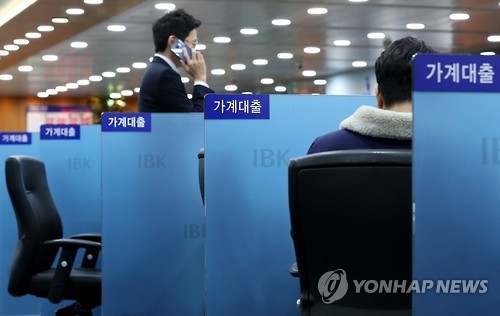South Korea's financial market has maintained stability in general this year, but it's coming under growing pressure from massive household debt and troubles in the corporate sector, the nation's central bank said Tuesday.
The Bank of Korea raised the possibility going forward that "financial system stability could decline," citing the household debt problem.

Household credit here jumped 11.2 percent on-year to 1,295.8 trillion won ($1,075 billion) in the third quarter of 2016. The household debt-to-disposable income ratio stood at 151.1 percent, up 7.4 percentage points from the end of last year.
"With the pace of household sector credit growth accelerating, household debt ratios are very high, and if the recent trend of increase in market interest rates continues, vulnerable households, in particular, could face debt repayment difficulties," the BOK said in a comprehensive report on the financial health of Asia's fourth-biggest economy. It was submitted to the National Assembly in accordance with legislation calling for the BOK to formally assess the stability of the country's financial market at least twice a year.
Especially, the proportion of floating-rate loans reached 71.6 percent as of end-September, with around 78.6 trillion won of loans exposed to potential defaults in consideration of borrowers' income and credit levels, it added.
The amount of loans for self-employed people, regarded as vulnerable to business cycles, has exceeded 460 trillion won.
Additionally, 6.4 percent of the total household debt was extended to "multiple" debtors with borrowings from three financial institutions or more.
The BOK also emphasized policymakers need to consider the likelihood of "continuing slumps in corporate business conditions."
Still, chances of any immediate financial crisis are slim, it said, given South Korea's relatively low short-term external debt ratio at 29.6 percent in the third quarter. The country's foreign exchange reserves rose to $372 billion as of November.
The BOK also pointed out that any abrupt outflow of foreign capital is unlikely as the South Korean economy has "favorable fundamentals" including its persistent current account surplus and the high grade of sovereign credit rating.
The financial soundness of both banks and non-bank financial institutions here has improved as well on increased assets and profitability, according to the BOK.
Commercial banks' total assets expanded 3.9 percent on-year to 1,444 trillion won as of end-September due to their "strengthening of risk management related corporate lending and active efforts for disposal of bad loans for example," it noted.
The substandard-or-below loan ratio stood at 0.95 percent, down 0.2 percentage point from the end of 2015.
Their liquidity coverage ratio and foreign currency liquidity ratio, indicative of the ability to respond to sudden fund outflows, stood at "favorable" levels of 106.2 percent and 105.8 percent, respectively, as of end-September, said the BOK.
The total assets of non-bank financial firms climbed 8.6 percent on-year to 2,242 trillion won in the third quarter.
Taking into account the overall circumstances surrounding South Korea's financial system, the Financial Stability Index (FSI) came to 7.1 in November, below the warning level of 8.0.
In the BOK's latest survey of systemic risk, 44 percent of 78 experts said chances of a financial crisis at home within the next year are low. Only 23 percent said chances are high. Nearly one third of the respondents picked the household debt problem as the No. 1 potential risk factor in the poll conducted between Sept. 27 and Oct. 6. (Yonhap)


![[Herald Interview] 'Amid aging population, Korea to invite more young professionals from overseas'](http://res.heraldm.com/phpwas/restmb_idxmake.php?idx=644&simg=/content/image/2024/04/24/20240424050844_0.jpg&u=20240424200058)













![[KH Explains] Korean shipbuilding stocks rally: Real growth or bubble?](http://res.heraldm.com/phpwas/restmb_idxmake.php?idx=652&simg=/content/image/2024/04/25/20240425050656_0.jpg&u=)

